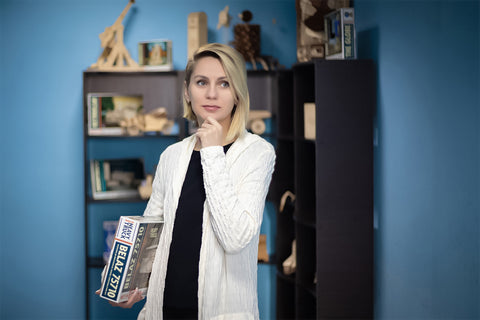10 SIGNIFICANT BENEFITS IN ASSEMBLING PUZZLES
Dec 10, 2020
When we think of puzzles, we usually think of a hobby, a way to spend free time and relax. In fact, in addition to all of the above, composing also has positive effects on physical and mental health. From developing a child’s skills, improving memory and mood, to preventing disease in the elderly.
Here you will find 10 surprising benefits in assembling puzzles and two additional benefits for children and the elderly.
BENEFITS OF PUZZLES
1. Brain / thought training
Assembling puzzles can be considered as complete brain exercise , as it activates both the left and right halves of the brain. The right side is in charge of creativity, emotions and instinctive thinking, while the left is the logical, objective and methodical side.
When putting together puzzles, both sides need to communicate and work together, which increases cognitive functions . The occipital part / cerebellum is the area where the brain connects colors and shapes, which is also activated. Exercise the mind helps prevent cognitive decline .

2. Better visual-spatial thinking
In order to assemble the puzzles, we need to put all these different pieces into a bigger picture. Regularly performing this exercise helps us improve spatial orientation .
3. Greater attention to detail
When solving a puzzle, especially if the parts are very similar, it is crucial that you pay attention to detail. You need to train your eyes to find small differences in colors or shapes to help you complete the puzzle. The ability to capture small details can help us in all aspects of our lives, especially at work. When we are more detailed and precise, the quality of our work improves.
4. Improving memory
It strengthens neural connections and increases the formation of new connections. It increases mental speed in thought processes .
When we take a piece of the puzzle, you need to find, among other things, the color or shape you have imagined, and visualize the final product on a large scale to see which pieces go together.
Exercising the part of the brain that takes care of storing this information helps maintain and improve it short-term memory .

5. Increase your IQ
Researchers withUniversity of Michigan under the leadership of dr. Susanne Jäggi found that only 25 minutes of solving puzzles or riddles a day, increases your IQ by 4 points .
6. Improves problem-solving ability
To solve the puzzles, you use different approaches to solve the problem, as it is trial and error testing. You also learn the value of formulating theories, testing hypotheses, and changing perspective when something doesn’t go as planned. You can transfer these skills to work, making you more innovative in problem solving, more so critical in thinking in better at adapting abilities .
7. Increase productivity
When you’re happier and when you’re not under stress, it’s easier to focus. Ko your concentration improves , yours productivity increases . If you have trouble focusing on your studies or work, take a short break, and put together a puzzle to you reset the brain . Many offices are starting to include puzzles and similar games in their break corners. These games help employees to take a few minutes off work and they return refreshed and ready for a fresh start.
8. Better cooperation and teamwork
Another benefit of puzzles that impact the workplace is that they help build collaboration between co-workers.Yale University researchers found that assembling puzzles helps improve relationships in ability to cooperate and work in teams .

9. Better mood
Assembling puzzles has many benefits, it increases the formation dopamine in the brain. This neuro transmitter is responsible for regulating mood and optimism. It also affects learning, memory, concentration and motivation. Dopamine is released each time when we put the puzzle together and even every time we put the piece in the right place . This encourages us to keep doing this and to set ourselves new challenges.
10. Reduces stress levels
In addition to challenging us, putting together puzzles also helps us relax. Our brains go from "Beta" or awake to states in "Alpha" state when assembling puzzles. The alpha state is similar to the state we are in, when we dream .
This shift in consciousness has a number of advantages, including:
- Ability deeper connection with people
- It improves ours mood
- It increases us self-confidence
- Easier stress
- Lowers blood pressure in heart beat
FOR CHILDREN DURING DEVELOPMENT
Dr. Verdine from the University of Delaware found that putting together puzzles, solving puzzles and playing with shapes helps to develop spatial orientations . This plays a fundamental role in the development of spatial consciousness and later comes into play when they begin to address the topics of science, technology, engineering, and mathematics.
Growing children also benefit from assembling puzzles in several different ways, it is only important that the size of the pieces and the problems always adapt to their age.
- Cognitive benefits : Puzzles help develop perception, organization, and concentration.
- Physical benefits : Although assembling puzzles does not seem to require physical exercise, motor coordination and controlled use of the hand are required, leading to the development of a “fine grip” (capturing a small thing between the thumb and forefinger).
- Emotional benefits : They also learn patience, self-confidence and self-control. Assembling a jigsaw puzzle takes time and effort. When we complete the puzzle, we feel admiration and recognition for the achievement, especially with the children.
- Puzzles are also used in occupational therapy after traumatic injuries to fingers and hands, as well as after brain injuries that we have to to re-learn the brain and improve coordination

FOR YOUR FUTURE: POSTPONING DEMENTIA AND ALZHEIMER'S DISEASE
Maintaining an active brain can slow down symptoms dementia in Alzheimer's disease .Medical studies have shown that maintaining the mind through puzzles and other problem-solving activities can reduce the amount of brain cell damage that occurs in patients with Alzheimer’s disease. It also supports growth of new nerve cells in strengthens the links between them .
Researchers also found the relationship between the number of years someone puts together puzzles and the likelihood of developing Alzheimer's disease . The sooner you start assembling puzzles as part of your life, the better. It’s never too late to start protecting your brain.
As you can see, assembling puzzles has many benefits for your health. From improving memory and preventing future illnesses, to improving mood and helping to develop learning and working skills.
Now that you know more about the benefits of puzzles for all ages ... what are you waiting for to start assembling?
If you want to put together a puzzle after reading this article, you can find inour stores a rich offer of puzzles with different levels of difficulty.
Original article:10 SURPRISING BENEFITS OF DOING PUZZLES
Author:Jimena G.
https://cronicaspuzzleras.com/en/


